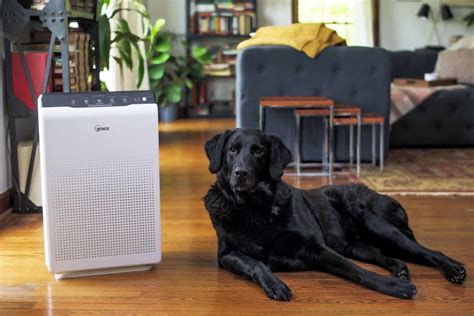Pets bring joy and companionship to our lives, but they can also contribute to indoor air quality issues. Dander, hair, and other allergens shed by pets can trigger respiratory problems, skin irritation, and other health concerns for both humans and animals. An air purifier can be a valuable tool for reducing these allergens and improving the overall health of your pet.

Why Air Purifiers Matter for Pet Health
According to the American Lung Association, indoor air pollution can be two to five times higher than outdoor air pollution. This is due to a number of factors, including:
- Pet dander: Pet dander is a major source of indoor allergens. It is made up of tiny flakes of skin that are shed by pets. Dander can remain airborne for hours, and it can easily be inhaled by humans and animals.
- Pet hair: Pet hair can also be a source of allergens. Hair can trap dander and other allergens, and it can be easily spread throughout the home.
- Other pet-related allergens: Pets can also produce other allergens, such as saliva, urine, and feces. These allergens can be particularly harmful to people with asthma or allergies.
- Dust is everywhere contains pollen, and even bacteria. Pet dander is like a magnet for dust. Given that, pet dander can increase the amount of dust in the house. Even if your pet doesn’t shed hair or dander, they can still make the air quality worse by adding more dust.
How Air Purifiers Benefit Pets
Air purifiers can help to reduce pet-related allergens in the home by:
- Trapping dander and hair: Air purifiers with HEPA filters can trap dander and hair, preventing them from circulating in the air.
- Removing other allergens: Air purifiers can also remove other pet-related allergens, such as saliva, urine, and feces.
- Reducing dust: Air purifiers can help to reduce dust, which can help to reduce the amount of pet dander in the air.
- Improving air quality: Air purifiers can improve the overall air quality in your home, which can be beneficial for both humans and animals.
Pros and Cons of Air Purifiers for Pets
There are several benefits to using an air purifier for pets, including:
- Reduced allergens: Air purifiers can help to reduce pet-related allergens in the home, which can improve the health of both humans and animals.
- Improved air quality: Air purifiers can improve the overall air quality in your home, which can be beneficial for both humans and animals.
- Peace of mind: Knowing that you are taking steps to improve the health of your pet can give you peace of mind.
However, there are also some potential drawbacks to using an air purifier for pets, including:
- Cost: Air purifiers can be expensive, especially if you need to purchase a large unit.
- Maintenance: Air purifiers require regular maintenance, such as changing the filter.
- Noise: Some air purifiers can be noisy, which can be a nuisance for both humans and animals.
Choosing the Right Air Purifier for Pets
When choosing an air purifier for pets, it is important to consider the following factors:
- The size of your home: The size of your home will determine the size of air purifier you need.
- The number of pets you have: The number of pets you have will also affect the size of air purifier you need.
- The type of pets you have: Some air purifiers are better at removing certain types of allergens than others. For example, if you have a cat, you will need an air purifier that is specifically designed to remove cat dander.
- Your budget: Air purifiers can range in price from $100 to $500. It is important to find an air purifier that fits your budget.
Tips and Tricks for Using Air Purifiers for Pets
Here are a few tips for using air purifiers for pets:
- Place the air purifier in a central location: This will help to ensure that the air purifier is able to circulate air throughout the entire home.
- Run the air purifier on a regular basis: The air purifier should be run on a regular basis, even when you are not home. This will help to keep the air clean and free of allergens.
- Change the filter regularly: The filter in the air purifier should be changed regularly according to the manufacturer’s instructions. A dirty filter will not be able to effectively remove allergens from the air.
- Keep the air purifier clean: The air purifier should be cleaned regularly to prevent the buildup of dust and dirt.
The Future of Air Purifiers for Pets
Air purifiers are becoming increasingly popular as people become more aware of the importance of indoor air quality. In the future, we can expect to see even more advances in air purifier technology. These advances will make air purifiers more effective, more affordable, and more user-friendly.
Conclusion
Air purifiers can be a valuable tool for improving the health of your pet. By reducing pet-related allergens in the home, air purifiers can help to improve the respiratory health, skin health, and overall well-being of your furry friend.





















